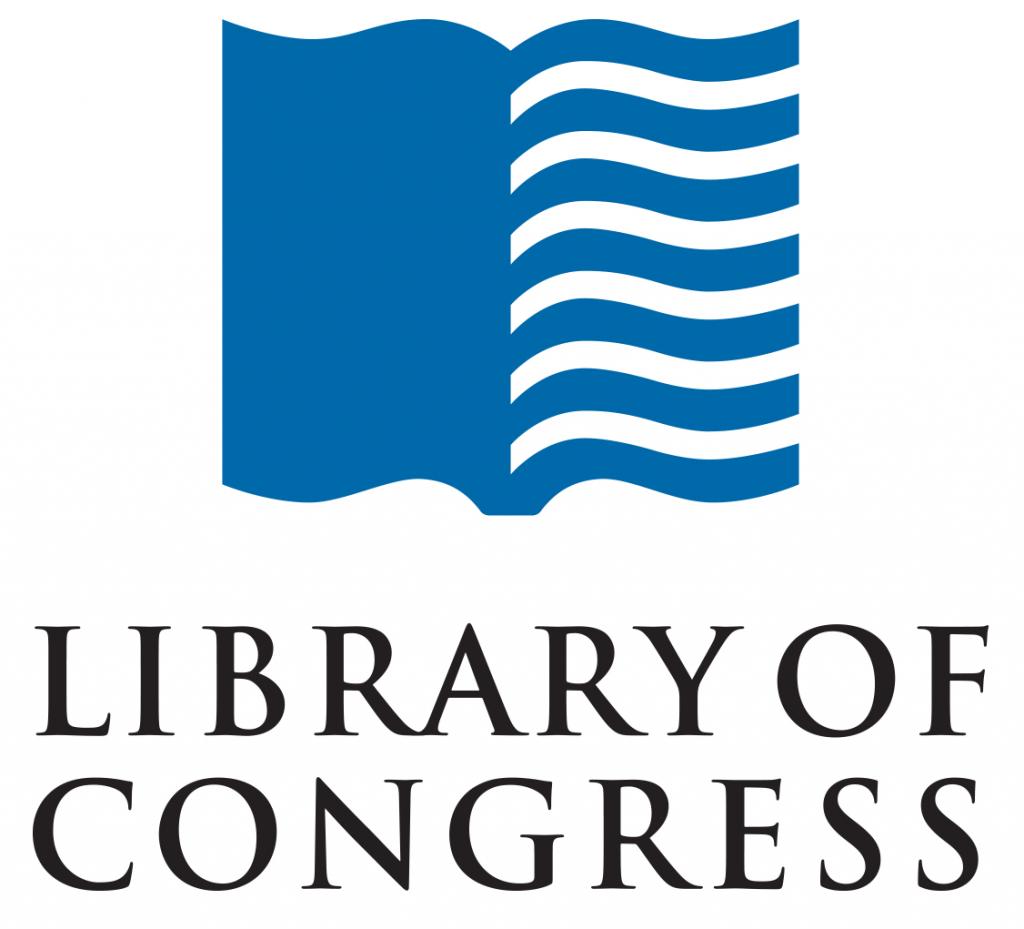from May. 1, 1866
Funeral Dirge of President Lincoln
-
Full Title
Funeral Dirge of President Lincoln
-
Description
Funeral dirge composed in honor of Abraham Lincoln's funeral. Composed for solo piano. Part of the Library of Congress Civil War Sheet Music Collection.
-
Source
-
Rights
Public Domain. Suggested credit line: Civil War Sheet Music Collection, Library of Congress, Music Division.
-
Tags
-
Cite this Item
Rynder, Rose. "Funeral Dirge of President Lincoln". Philadelphia: Marsh & Bubna, 1866. Remembering Lincoln. Web. Accessed June 15, 2025. https://rememberinglincoln.fords.org/node/1023
from May. 1, 1866
Funeral Dirge of President Lincoln

-
Description
Funeral dirge composed in honor of Abraham Lincoln's funeral. Composed for solo piano. Part of the Library of Congress Civil War Sheet Music Collection.
-
Source
-
Rights
Public Domain. Suggested credit line: Civil War Sheet Music Collection, Library of Congress, Music Division.
-
Creator
Rynder, Rose
-
Publisher
Philadelphia: Marsh & Bubna, 1866
-
Date
May 1, 1866
from May. 1, 1865
Lincoln's requiem
-
Full Title
Lincoln's requiem
-
Description
Lincoln's requiem was composed for chorus (mixed voices, 4 parts) and piano. Associated with the Union side, the song mourns President Lincoln's death and praises his legacy as an advocate for freedom and liberty. The lyrics consist of five verses and a refrain. Part of the Library of Congress Civil War Sheet Music Collection.
-
Transcription
Verse:
Dead! dead! how swift the dire news flies,
And wakes a nation's agonies!
From town to town, from mouth to mouth
Swift spreads the dreaded message forth;
In lowly cot, in lordly hall,
This grief enshrouds and covers all.
And on the breast drops ev'ry head,
In sorrow for the noble dead.
Chorus:
Oh, weep for fallen greatness! weep!
Let tears express our woes;
But while our Lincoln's soul doth sleep,
Brave men strike down his foes!
Verse:
Dead! dead! but not as warriors die,
He fell not shouting battle cry--
Not in the open light of heavn'--
Not in his home his soul was risen--
Not on the plain where hand to hand
The brave cross blade with foemen's brand,
But where the waves of pleasure flow,
Death aim'd his shaft thro' secret foe. [Chorus]
Verse:
Dead! dead! and now when hopes were high,
And wars dread curse was passing by,
When traitors had their madness stay'd,
And hero hands sheathed vegeful blade,
When homes and hearthstones gleamd afar,
To manly hearts grown tired of war,
And long wooed peace had left the sky,
It was no time for him to die. [Chorus]
Verse:
Dead! dead! and when the millions free
Sent up their shouts of liberty,
When from the depths of bondage wrung,
Sweet freedoms song, by freedmen sung,
When million hearts their thanks out pour'd
And angel ears in pleasure heard,
When words his hand has trac'd live on
It is not meet to mourn him gone. [Chorus]
Verse:
Dead! dead! and has he died in vain?
Shall we in lethargy remain?
His years of patriot toil forget
Shall unavenged his life sun set?
No! for this blow in treach'ry given,
The smoke of strife shall rise to heav'n,
And 'till our flag in triumph waves
His foes and ours find bloody graves! [Chorus]
-
Source
-
Rights
Public Domain. Suggested credit: Civil War Sheet Music Collection, Library of Congress, Music Division.
-
Tags
-
Cite this Item
Butterfield, J. A. (composer); Boynton, Irene (lyricist). "Lincoln's requiem". Chicago: H. M. Higgins, 1865. Remembering Lincoln. Web. Accessed June 15, 2025. https://rememberinglincoln.fords.org/node/1021
from May. 1, 1865
Lincoln's requiem

-
Description
Lincoln's requiem was composed for chorus (mixed voices, 4 parts) and piano. Associated with the Union side, the song mourns President Lincoln's death and praises his legacy as an advocate for freedom and liberty. The lyrics consist of five verses and a refrain. Part of the Library of Congress Civil War Sheet Music Collection.
-
Source
-
Rights
Public Domain. Suggested credit: Civil War Sheet Music Collection, Library of Congress, Music Division.
-
Creator
Butterfield, J. A. (composer); Boynton, Irene (lyricist)
-
Publisher
Chicago: H. M. Higgins, 1865
-
Date
May 1, 1865
from May. 1, 1866
In memoriam, A. Lincoln
-
Full Title
In memoriam, A. Lincoln
-
Description
"In memoriam, A Lincoln" was composed by Gertrude I. Ladd. The ballad is set for voice and piano in English. It contains two verses of lyrics that discuss President Lincoln's assassination as a sacrifice for freedom in the United States. Part of the Library of Congress Civil War Sheet Music Collection.
-
Transcription
Within the nations heart today,
In honor brightly set,
There lives a cherish'd memory
That buddeth greenly yet
And ever will time cannot change
The love which death has made
Sacred to all, yet to become
The people's heritage.
But words are ever weak for praise,
There is no need to dwell
Upon the strong and tender heart
That all could read so well;
Always for worthy victories won
Is paid a costly price,
Then freedom at her need has had
A worthy sacrafice.
-
Source
-
Rights
Public Domain. Suggested credit line: Civil War Sheet Music Collection, Library of Congress, Music Division.
-
Tags
-
Cite this Item
Ladd, Gertrude I. . "In memoriam, A. Lincoln". New York: C. M. Tremaine, 1866. Remembering Lincoln. Web. Accessed June 15, 2025. https://rememberinglincoln.fords.org/node/1020
from May. 1, 1866
In memoriam, A. Lincoln
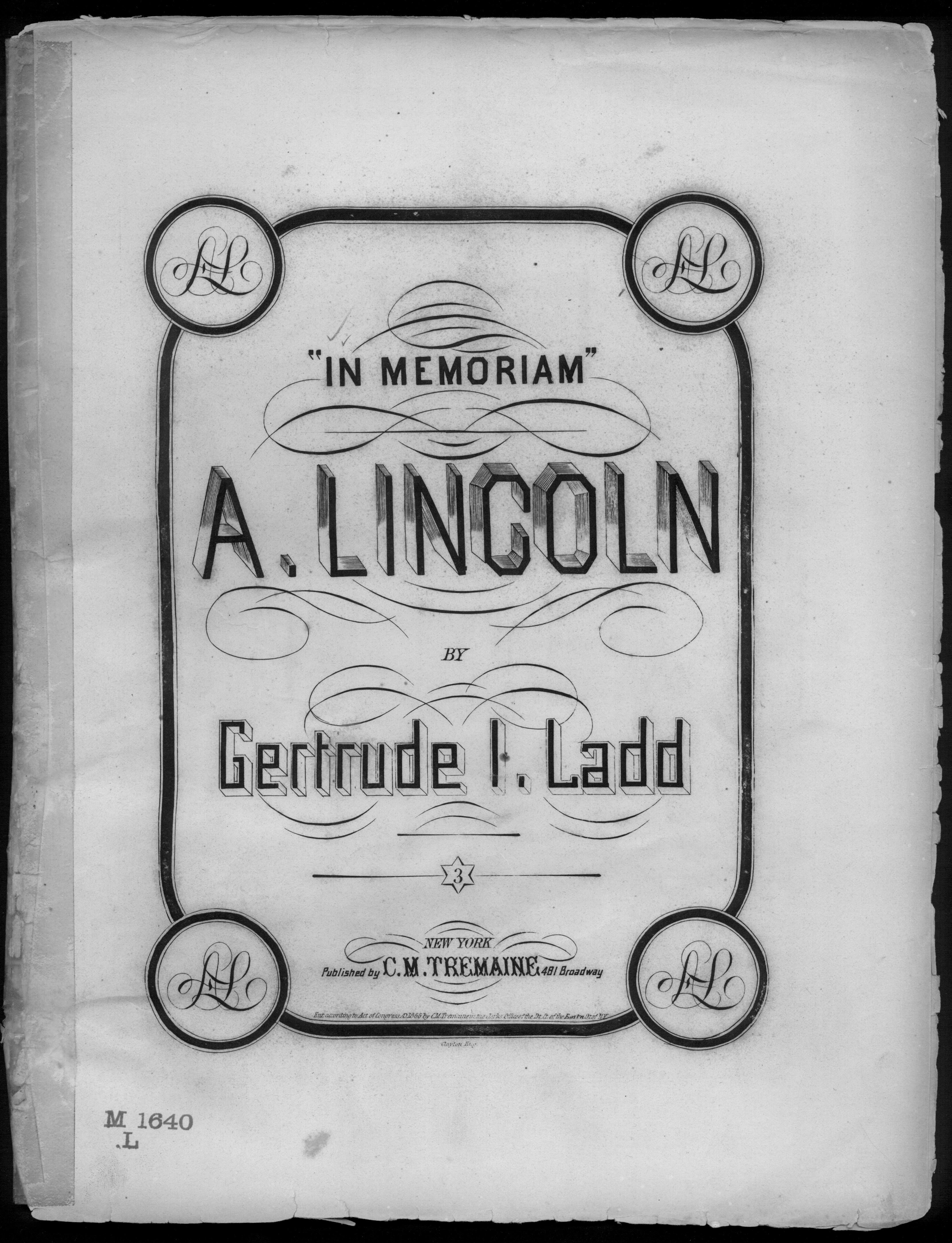
-
Description
"In memoriam, A Lincoln" was composed by Gertrude I. Ladd. The ballad is set for voice and piano in English. It contains two verses of lyrics that discuss President Lincoln's assassination as a sacrifice for freedom in the United States. Part of the Library of Congress Civil War Sheet Music Collection.
-
Source
-
Rights
Public Domain. Suggested credit line: Civil War Sheet Music Collection, Library of Congress, Music Division.
-
Creator
Ladd, Gertrude I.
-
Publisher
New York: C. M. Tremaine, 1866
-
Date
May 1, 1866
-
Material
sheet music
from
Philadelphia Funeral Procession Details
-
Full Title
Philadelphia Funeral Procession Details
-
Description
This document describes the arrangement of the funeral procession that accompanied Abraham Lincoln's body while in Philadelphia. The text describes the street routes of the procession, the logistics of moving from Independence Hall for the viewing to Christ Church for the religious funeral services, and the order, formation, and conduct of the procession.
-
Source
The Abraham Lincoln Foundation of The Union League of Philadelphia (Object ID: XI.2.1963.3.1)
-
Rights
Use of this item for research, teaching and private study is permitted with proper citation and attribution, as “Courtesy of The Abraham Lincoln Foundation of The Union League of Philadelphia.” Reproduction of this item for publication, broadcast or commercial use requires written permission. For permission, please contact The Abraham Lincoln Foundation.
-
Tags
-
Cite this Item
Unknown. "Philadelphia Funeral Procession Details". Remembering Lincoln. Web. Accessed June 15, 2025. https://rememberinglincoln.fords.org/node/1010
from
Philadelphia Funeral Procession Details
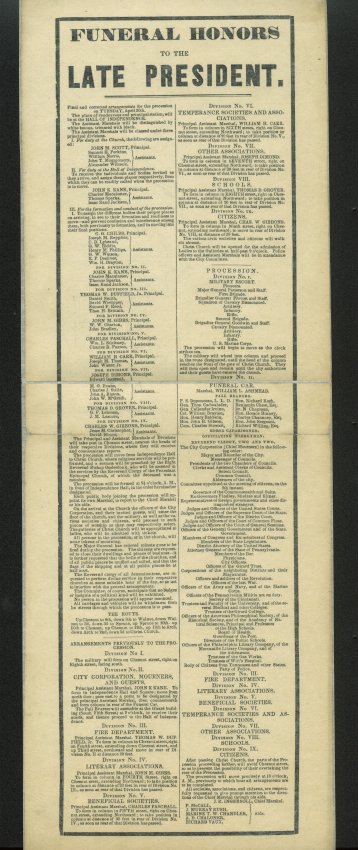
-
Description
This document describes the arrangement of the funeral procession that accompanied Abraham Lincoln's body while in Philadelphia. The text describes the street routes of the procession, the logistics of moving from Independence Hall for the viewing to Christ Church for the religious funeral services, and the order, formation, and conduct of the procession.
-
Source
The Abraham Lincoln Foundation of The Union League of Philadelphia (Object ID: XI.2.1963.3.1)
-
Rights
Use of this item for research, teaching and private study is permitted with proper citation and attribution, as “Courtesy of The Abraham Lincoln Foundation of The Union League of Philadelphia.” Reproduction of this item for publication, broadcast or commercial use requires written permission. For permission, please contact The Abraham Lincoln Foundation.
-
Creator
Unknown
-
Material
Ink and paper
from Apr. 22, 1865
Union League Funeral Ticket
-
Full Title
Union League of Philadelphia Funeral Invitation Ticket
-
Description
President Lincoln's funeral procession traveled from Washington, D.C., to Springfield, Illinois. When the procession stopped in Philadelphia, members of the Union League received the President's body at Independence Hall before the public viewing on April 23.
-
Source
The Abraham Lincoln Foundation of The Union League of Philadelphia (Object ID: XI.2.004)
-
Rights
Use of this item for research, teaching and private study is permitted with proper citation and attribution, as “Courtesy of The Abraham Lincoln Foundation of The Union League of Philadelphia.” Reproduction of this item for publication, broadcast or commercial use requires written permission. For permission, please contact The Abraham Lincoln Foundation.
-
Tags
-
Cite this Item
Union League of Philadelphia. "Union League of Philadelphia Funeral Invitation Ticket". Remembering Lincoln. Web. Accessed June 15, 2025. https://rememberinglincoln.fords.org/node/1007
from Apr. 22, 1865
Union League of Philadelphia Funeral Invitation Ticket
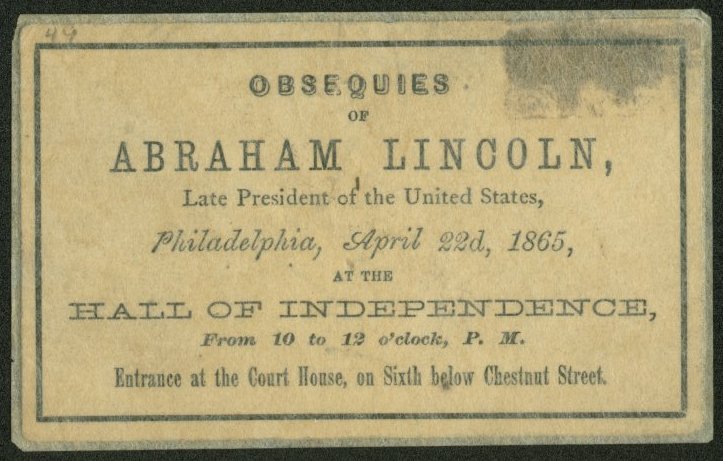
-
Description
President Lincoln's funeral procession traveled from Washington, D.C., to Springfield, Illinois. When the procession stopped in Philadelphia, members of the Union League received the President's body at Independence Hall before the public viewing on April 23.
-
Source
The Abraham Lincoln Foundation of The Union League of Philadelphia (Object ID: XI.2.004)
-
Rights
Use of this item for research, teaching and private study is permitted with proper citation and attribution, as “Courtesy of The Abraham Lincoln Foundation of The Union League of Philadelphia.” Reproduction of this item for publication, broadcast or commercial use requires written permission. For permission, please contact The Abraham Lincoln Foundation.
-
Creator
Union League of Philadelphia
-
Date
April 22, 1865
-
Material
Ink and Paper
from Apr. 23, 1865
A Sermon, Occasioned by the Assassination of Abraham Lincoln, President of the United States
-
Full Title
A Sermon, Occasioned by the Assassination of Abraham Lincoln, President of the United States
-
Description
Sermon preached by Pliny H. White at Coventry, Vermont. Whine opens his remarks by addressing the severity of the loss of President Lincoln, the first president ever assassinated. He praises Lincoln for his personal virtues, public service, and personal magnetism. He also compares the death of Lincoln to other rulers in history and religious leaders like Moses, and what Scripture says on how to mourn such losses. Whine hopes that the sermon today will help pay respects to the fallen president, seek consolation and consider current duties in the face of turmoil. During the 19th century, it became popular to publish sermons in newspapers and magazines. Both the Union and the Confederacy reported increased religious fervor during the war. "Abraham Lincoln struggled personally with trying to understand the war in religious terms. Many, including Lincoln, came to see the war as a punishment for disunity and religious failures. A powerful theme of the sermons is the providence of God. Many people viewed Lincoln as a martyr, and often he was compared to Moses, Abraham, and George Washington. Lincoln's assassination took place on Good Friday, so most sermons about his death occurred that following Sunday at services." - The Martyred President, Emory University Libraries.
-
Transcription
Transcript available on The Martyred President: Sermons Given on the Occasion of the Assassination of Abraham Lincoln
-
Source
-
Rights
This item is in the public domain. As a service to other researchers, we request that users credit the Emory University Libraries as the source.
-
Tags
-
Cite this Item
Pliny H. White. "A Sermon, Occasioned by the Assassination of Abraham Lincoln, President of the United States". The Vermont Record Office. Remembering Lincoln. Web. Accessed June 15, 2025. https://rememberinglincoln.fords.org/node/992
from Apr. 23, 1865
A Sermon, Occasioned by the Assassination of Abraham Lincoln, President of the United States
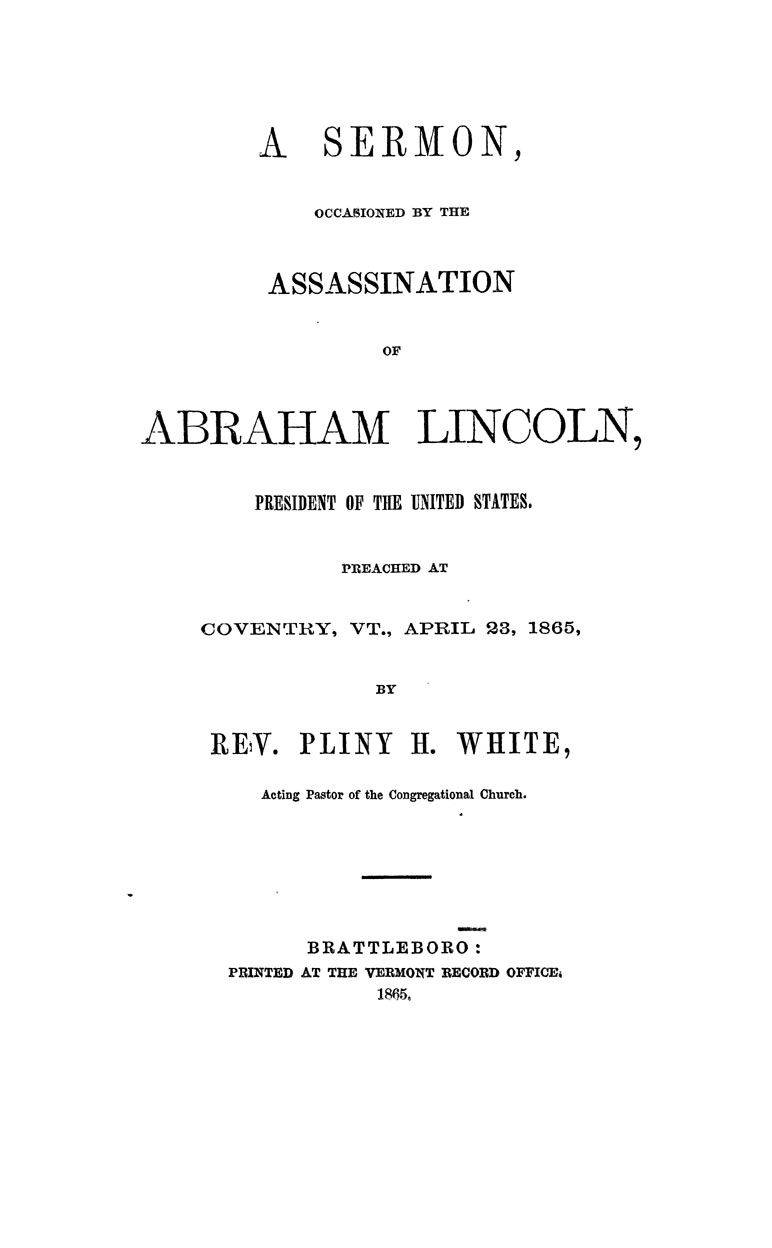
-
Description
Sermon preached by Pliny H. White at Coventry, Vermont. Whine opens his remarks by addressing the severity of the loss of President Lincoln, the first president ever assassinated. He praises Lincoln for his personal virtues, public service, and personal magnetism. He also compares the death of Lincoln to other rulers in history and religious leaders like Moses, and what Scripture says on how to mourn such losses. Whine hopes that the sermon today will help pay respects to the fallen president, seek consolation and consider current duties in the face of turmoil. During the 19th century, it became popular to publish sermons in newspapers and magazines. Both the Union and the Confederacy reported increased religious fervor during the war. "Abraham Lincoln struggled personally with trying to understand the war in religious terms. Many, including Lincoln, came to see the war as a punishment for disunity and religious failures. A powerful theme of the sermons is the providence of God. Many people viewed Lincoln as a martyr, and often he was compared to Moses, Abraham, and George Washington. Lincoln's assassination took place on Good Friday, so most sermons about his death occurred that following Sunday at services." - The Martyred President, Emory University Libraries.
-
Source
-
Rights
This item is in the public domain. As a service to other researchers, we request that users credit the Emory University Libraries as the source.
-
Creator
Pliny H. White
-
Publisher
The Vermont Record Office
-
Date
April 23, 1865
from May. 1, 1865
O Captain! My Captain!
-
Full Title
O Captain! My Captain!
-
Description
Autograph document signed by Walt Whitman, containing stanzas from “O Captain! My Captain!”, Whitman’s elegy to Lincoln. The poet submitted this document to Charles Aldrich for his collection of autographs, which he donated to the State of Iowa in 1884. Aldrich was the first curator of the State Historical Department of Iowa, now the State Historical Society of Iowa. Although Whitman composed the poem in 1865, the date of this autograph is unknown.
-
Transcription
O Captain! my Captain!
O Captain! my Captain! our fearful trip is done,
The ship has weather’d every rack, The prize we sought is won,
The port is near, the bells I hear, The people all exulting,
While follow eyes the steady keel, The venel grim and daring;
But O heart! heart! heart!
O the bleeding drops of red,
Where on the deck my Captain lies,
Fallen cold and dead.
O Captain! my Captain! rise up and hear the bells;
Rise up for you the flag is flung for you the bugle trills,
For you bouquets and ribbon’d wreaths for you the shores a crowding,
For you they call, The swaying man, Their eager faces turning;
Here Captain! dear father!
This arm beneath your head!
It is some dream that on the deck,
You’ve fallen cold and dead.
My Captain does not answer, his lips are pale and still,
My father does not feel my arm, he has no pulse nor will,
The ship is anchor’d safe and sound, its voyage closed and done;
From fearful trip the victor ship comes in with object won;
Exult O shores and ring O bells!
But I with mournful tread,
Walk the deck my Captain lies,
Fallen cold and dead.
Walt Whitman
with best wishes prayers & love for the people of Iowa - WW
[Transcription team:
Megan O., Laney R., Kiersten T., Alexis W.
New Hampton Middle School, New Hampton, Iowa] -
Source
Charles Aldrich Autograph Collection, State Historical Society of Iowa, Des Moines
-
Rights
Use of this item for research, teaching and private study is permitted with proper citation, and attribution. Reproduction of this item for publication, broadcast or commercial use requires written permission. for permission, please contact State Historical Society of Iowa.
-
Tags
-
Cite this Item
Whitman, Walt. "O Captain! My Captain!". Remembering Lincoln. Web. Accessed June 15, 2025. https://rememberinglincoln.fords.org/node/938
-
Creator
Whitman, Walt
-
Date
unknown
from May. 1, 1865
O Captain! My Captain!
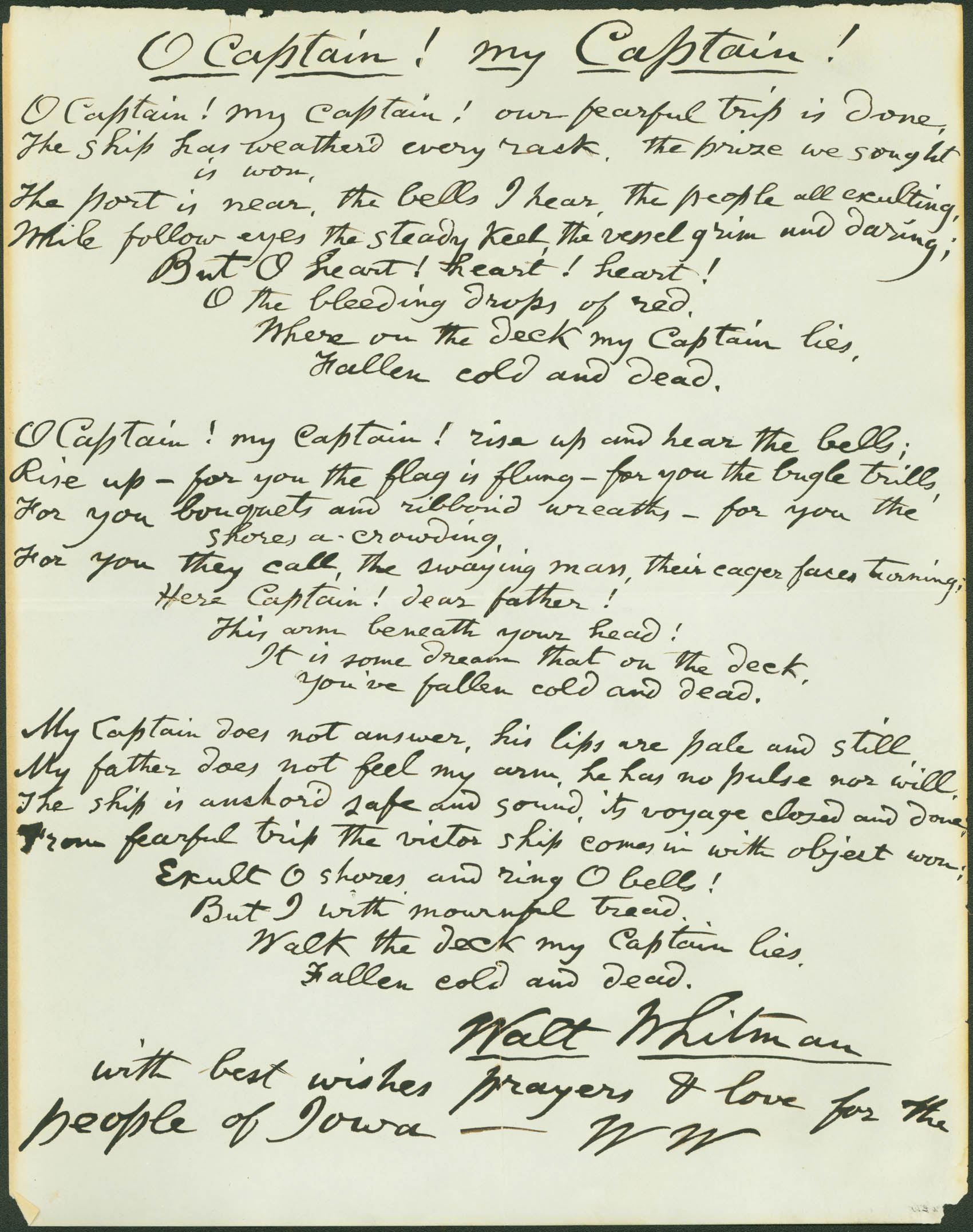
-
Description
Autograph document signed by Walt Whitman, containing stanzas from “O Captain! My Captain!”, Whitman’s elegy to Lincoln. The poet submitted this document to Charles Aldrich for his collection of autographs, which he donated to the State of Iowa in 1884. Aldrich was the first curator of the State Historical Department of Iowa, now the State Historical Society of Iowa. Although Whitman composed the poem in 1865, the date of this autograph is unknown.
-
Source
Charles Aldrich Autograph Collection, State Historical Society of Iowa, Des Moines
-
Rights
Use of this item for research, teaching and private study is permitted with proper citation, and attribution. Reproduction of this item for publication, broadcast or commercial use requires written permission. for permission, please contact State Historical Society of Iowa.
-
Creator
Whitman, Walt
-
Date
May 1, 1865
